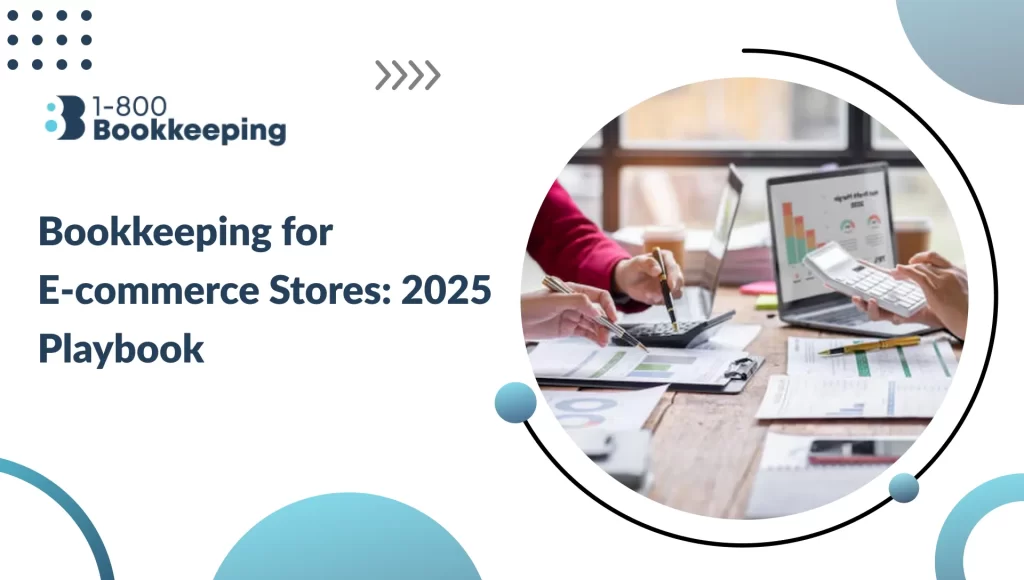Financial literacy is a vital skill for small business owners. It encompasses the ability to understand and manage financial resources effectively. It includes knowledge of key financial concepts, the capability to analyze financial statements, budgeting, and the strategic management of cash flow, debt, and investments. Financial literacy is not just a buzzword; it’s an essential component for the success and sustainability of any small business.
In this article, we will explore various aspects of financial literacy for small business owners, from understanding financial statements to leveraging technology for financial management. By the end, you will understand the financial tools and strategies to help you manage your business more effectively.
Partnering with 1-800 Bookkeeping for Efficient Bookkeeping
At 1-800 Bookkeeping, we understand the critical role that accurate bookkeeping plays in the overall success of small businesses. Our services are designed to help businesses maintain high-quality financial records, ensuring smooth operations and compliance with financial regulations.
- Expert Bookkeeping Services: Our expert bookkeeping services ensure that all financial transactions are recorded accurately and comprehensively. We help businesses maintain precise financial records, providing a solid foundation for reliable financial management and decision-making.
- Comprehensive Financial Reporting: We offer comprehensive financial reporting services, providing clear and detailed financial statements. Our reporting services help businesses present a transparent and accurate picture of their financial health, which is crucial for strategic planning and growth.
- Tax Preparation and Compliance: Our tax preparation and compliance services help businesses maintain overall financial health, ensuring that all tax obligations are met accurately and on time. We help businesses avoid potential liabilities, allowing them to focus on their core operations and growth.
Our financial management and advisory services expertise has enabled numerous businesses to maintain precise financial records and achieve their business goals. Partner with 1-800 Bookkeeping to ensure your business’s continued success. Contact us today for a complimentary consultation.
Understanding Financial Statements
One of the foundational elements of financial literacy is understanding financial statements. These documents provide a snapshot of your business’s financial health and are crucial for informed decision-making. The three primary financial statements every business owner should know are:
Income Statement
The income statement, the profit and loss statement, summarizes your revenues, costs, and expenses over a specific period. It shows whether your business is profitable or not. Key components include:
- Revenue: Total income from sales or services.
- Cost of Goods Sold (COGS): Direct costs attributable to the production of goods sold.
- Gross Profit: Revenue minus COGS.
- Operating Expenses: Costs required to run the business.
- Net Profit: Gross profit minus operating expenses.
Balance Sheet
The balance sheet provides a snapshot of your business’s financial position at a specific time. It includes:
- Assets: Resources owned by the business (e.g., cash, inventory, equipment).
- Liabilities: Obligations owed to outsiders (e.g., loans, accounts payable).
- Equity: Owner’s interest in the business, calculated as assets minus liabilities.
Cash Flow Statement
The cash flow statement tracks the cash flow in and out of your business over time. It’s divided into three sections:
- Operating Activities: Cash generated or used in regular business operations.
- Investing Activities: Cash is used to invest in assets or receive investment returns.
- Financing Activities: Cash flow from borrowing or repaying debt and equity financing.
Interpreting Financial Statements
To make informed decisions, you must know how to interpret these statements. For instance, consistently negative net profit indicates a need to reassess your revenue model or cut down expenses. Regularly monitoring your balance sheet helps maintain a healthy balance between assets and liabilities.
The Importance of Budgeting
Budgeting is a crucial aspect of financial management that helps small businesses allocate resources effectively. It involves setting financial goals, estimating revenue, and planning for expenses.
Creating a Budget
Begin by listing all expected income sources and expenses. Categorize expenses into fixed costs (e.g., rent, salaries) and variable costs (e.g., utilities, raw materials). Tools like spreadsheets or budgeting software can simplify this process.
Monitoring Expenses
Track your expenses regularly against the budget to ensure you stay on course. This will help you identify areas where you are overspending and need to cut back.
Adjusting the Budget
A budget is a dynamic tool that should be adjusted as circumstances change. For instance, if your revenue projections are unmet, you may need to revise your spending plans.
Cash Flow Management Tips
Effective cash flow management ensures that your business has enough cash to meet its obligations while maximizing profitability.
Understanding Cash Flow Cycles
Every business has a cash flow cycle, which is the time between outlaying cash for raw materials and receiving customer payments. Understanding this cycle helps in planning for periods of cash shortfall.
Tips for Maintaining Positive Cash Flow
- Invoice Promptly: Send invoices once a sale is completed to hasten payments.
- Manage Inventory: Avoid overstocking, which ties up cash.
- Negotiate Payment Terms: With suppliers, try to extend payment terms while offering customers shorter terms.
Tools for Cash Flow Management
Utilize accounting software that includes cash flow management features. These tools can automate invoicing, track expenses, and provide real-time cash flow insights.
Debt Management and Credit
Managing debt effectively is vital for maintaining the financial health of your business.
Types of Business Debt
Business debt can be classified into short-term (e.g., working capital loans) and long-term (e.g., equipment financing). Each type of debt has different implications for cash flow and financial planning.
Strategies for Debt Repayment
- Prioritize High-Interest Debt: First, focus on repaying high-interest debt to reduce total interest payments.
- Consolidate Debt: Combining multiple debts into a single payment can simplify management and may reduce interest rates.
- Regular Payments: Ensure timely repayments to avoid penalties and maintain a good credit score.
Importance of Business Credit Scores
A good business credit score is essential for securing loans with favorable terms. You can maintain a good score by managing your debts responsibly and monitoring your credit report regularly.
Tax Planning and Compliance
Tax planning helps minimize your tax liabilities and ensure compliance with tax laws.
Understanding Tax Obligations
Know the types of taxes your business is liable to pay, such as income, sales, and payroll, and understand the deadlines for filing and paying these taxes.
Common Tax Deductions
Small businesses can benefit from several tax deductions, such as:
- Home Office Deduction: You may deduct some of your home expenses if you run your business from home.
- Vehicle Expenses: Deductions for business use of your vehicle.
- Startup Costs: Initial expenses incurred before starting your business.
Tips for Tax Preparation
- Keep Accurate Records: Maintain detailed records of all transactions.
- Use Tax Software: Tools can simplify tax preparation.
- Consult a Tax Professional: For complex tax issues, seek the help of a certified accountant.
Investment Strategies for Small Businesses
Investment strategies can help small businesses grow and achieve long-term success.
Types of Investments
- Reinvestment in Business: Invest in new equipment, technology, or marketing to drive growth.
- Financial Investments: Stocks, bonds, or other financial instruments can diversify income sources.
- Real Estate: Purchasing property can provide long-term returns and asset appreciation.
Risk Assessment
Before making any investment, assess the associated risks. While high-risk investments can offer high returns, they also have the potential for significant losses.
Balancing Investments with Business Goals
Align your investment strategy with your business goals. For instance, if your goal is rapid expansion, reinvesting in business operations may be more appropriate than investing in low-risk, low-return financial instruments.
Financial Risk Management
Identifying and managing financial risks is crucial for the stability of your business.
Types of Financial Risks
- Market Risk: The risk of losses due to market fluctuations.
- Credit Risk: The risk of customers defaulting on payments.
- Operational Risk: Risks from internal processes, systems, or external events.
Risk Management Strategies
- Diversification: Spread investments across different assets to reduce risk.
- Insurance: Policies like business interruption, liability, and property insurance can protect against unforeseen events.
- Contingency Planning: Prepare for potential risks with a well-thought-out contingency plan.
Importance of Insurance
Insurance is a critical component of risk management. Ensure you have adequate coverage to protect against liabilities, property damage, and other risks that could disrupt your business operations.
Leveraging Technology for Financial Management
Technology can significantly enhance financial management, making it more efficient and accurate.
Financial Management Software
Financial management tools offer comprehensive accounting, invoicing, and expense-tracking solutions. These platforms can automate routine tasks, reduce errors, and provide real-time financial insights.
Online Resources for Financial Education
Numerous online resources offer courses in financial literacy. These platforms provide valuable knowledge and skills to help you manage your business finances.
Using Technology to Streamline Financial Processes
- Automated Invoicing: Reduce the manual effort and ensure timely payments.
- Expense Tracking Apps: Tools can simplify expense reporting and reimbursement processes.
- Financial Dashboards: Real-time dashboards provide an overview of your financial health, helping in informed decision-making.
Continuous Learning and Professional Help
Financial literacy is not a one-time achievement but an ongoing process.
Resources for Continuous Learning
Update your knowledge regularly through books, online courses, seminars, and webinars. Subscriptions to business magazines and financial news sites can also keep you informed about the latest trends and regulations.
Benefits of Hiring a Financial Advisor
A financial advisor can provide personalized advice tailored to your business needs. They can help with strategic planning, investment decisions, and risk management.
Leveraging Bookkeeping Services
Outsourcing bookkeeping can free up your time to focus on core business activities. Professional bookkeepers ensure that your financial records are accurate and up to date, providing you with reliable data for decision-making.
Conclusion
Financial literacy for small business owners is a multifaceted discipline that plays a vital role in the success and sustainability of a business. From understanding financial statements to leveraging technology and continuous learning, each aspect contributes to a comprehensive financial management strategy.
By implementing the practices discussed in this guide, small business owners can make informed financial decisions, manage risks effectively, and achieve long-term business goals. Continuous improvement and adaptation are crucial, as the financial landscape is ever-evolving. Embrace the challenge, invest in your financial education, and take proactive steps to secure your business’s financial future.
Feeling Overwhelmed by Bookkeeping? We Can Help.
Running a business is demanding, and keeping track of your finances can be a never-ending chore. Many business owners need help with the complexities of bookkeeping, which can leave them frustrated and behind.
1-800 Bookkeeping offers expert services to streamline your financial processes and empower you to make informed decisions.
Our team of seasoned professionals understands the unique challenges businesses of all sizes face. We can help you:
- Free Up Valuable Time: Offload your bookkeeping tasks to our dedicated professionals.
- Gain Peace of Mind: Ensure your financial records are accurate and up-to-date.
- Make Smarter Decisions: Get actionable insights into your business performance through clear and concise reports.
- Feel Confident: Make informed financial decisions based on reliable data.
Don’t let bookkeeping hold you back from achieving your business goals. Contact 1-800 Bookkeeping today for affordable bookkeeping solutions.
FAQs:
1. Why is financial literacy important for small business owners?
Financial literacy is essential because it helps business owners understand and manage their financial resources effectively, make informed decisions, and ensure the sustainability and success of their business.
2. What are the three primary financial statements every business owner should know?
The three primary financial statements are the income statement, balance sheet, and cash flow statement. Each provides critical insights into different aspects of the business’s financial health.
3. How can budgeting help small businesses?
Budgeting helps small businesses allocate resources effectively, set financial goals, monitor expenses, and make necessary adjustments to stay on track and achieve financial stability.
4. What are some tips for managing cash flow?
To maintain positive cash flow, send invoices promptly, manage inventory efficiently, and negotiate favorable payment terms with suppliers and customers.
5. How can technology aid in financial management for small businesses?
Technology, such as financial management software and expense-tracking apps, can automate routine tasks, reduce errors, provide real-time financial insights, and streamline financial processes.





